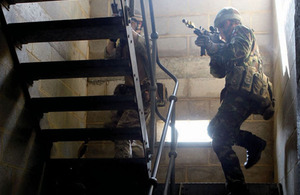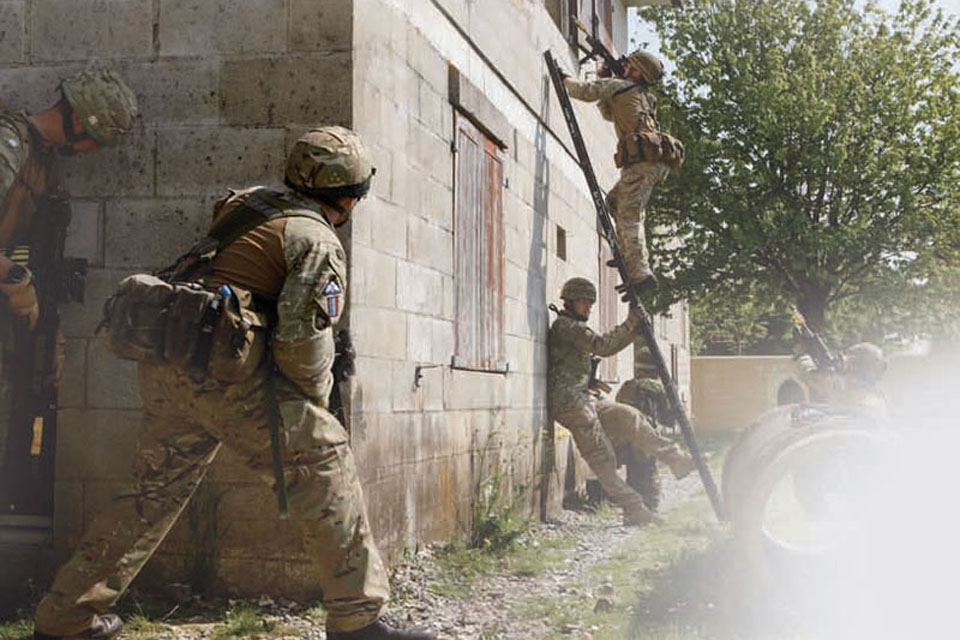Soldiers train for operations after Afghanistan
A fresh focus is being put on fighting in metropolitan areas as the British Army prepares for operations beyond Afghanistan.

Soldiers attending the Urban Operators Instructors Course at Copehill Down [Picture: Steve Dock, Crown Copyright/MOD 2012]
The Field Training Unit (FTU) has launched the Urban Operators Instructors Course to drill troops in skills and tactics for environments far removed from the dusty expanses of Helmand province.
In the two-week package at Copehill Down, Service personnel turn their hands to the alternative disciplines under the gaze of experienced assessors.
Explaining what the new programme offers, Captain Andy Jennings, Royal Engineers, said:
This has been designed for troops who are already instructors but it’s the first time a formal qualification can be earned.
The opening week involves demonstrations and teaching from FTU personnel and the second sees students become the teachers.
The intensive course has been developed in line with the findings of the Future Land Operating Concept and Future Character of Conflict papers, which state that warfare in coming years is likely to occur in urban areas.
As a result, soldiers in training found themselves storming across pedestrianised precincts into houses and coming under fire from snipers holed up in high-rise flats, rather than patrolling through open spaces:

The Urban Operators Instructors Course drills troops in skills and tactics for environments far removed from the dusty expanses of Helmand province [Picture: Steve Dock, Crown Copyright/MOD 2012]
“It’s predicted that, by 2020, 60 per cent of the world’s population will be in the urban environment, so the chance of fighting in rural areas is negligible,” explained FTU officer Major Mark Suddaby.
That’s why we are growing this way of urban fighting.
The course is open to all cap badges, and ranks from lance corporal to captain face the challenge of operating in a confined environment with reduced lines of sight and areas of blocked communications.
To aid with the assessment and development of students, the Salisbury Plain facility operates a low-level urban skills trainer.
This state-of-the-art kit uses radio frequency tags and wireless sensors connected to soldiers’ weapons to monitor their every move.
Actions are recorded and then played back to troops on screen:
This equipment provides instrumentation throughout exercises - it’s the only training other than live serials where you see the real effects of grenades and get that level of fidelity,” Major Suddaby added.
We relay the action on a big monitor then rerun the situation to put any errors right - the ability it gives us to confirm troop skills is fantastic.
Operating in a situation that mimicked military encounters in Bosnia and Northern Ireland rather than southern Afghanistan, one soldier was ‘shot’ as he walked across the town square:
We were required to react at speed to evacuate the casualty while defending against a sniper and angry citizens,” commented Sergeant Donald Buchan, from 5th Battalion The Royal Regiment of Scotland.
It was physically demanding and tested everything the men knew about dealing with an injury while on a mission.
Elsewhere the student instructors were required to handle prisoners of war, attacks from all angles and booby traps.
On one occasion, servicemen worked under the cover of smoke as explosives were detonated and rapid entry was made into a besieged building.
With personnel safely tucked in behind walls of the mock estate, gunfire rained down.
Speaking amid sporadic explosions, FTU instructor Sergeant Simon Hodgkinson, from 1st Battalion The Rifles, said:
After a scenario is finished, I talk through what went right and wrong.
The soldiers get a chance to put all their orders into practice as they get about six battle exercises and reviews each day.
Being two weeks long, you get more opportunities to go into greater detail than in the past.
Relearning the skills and drills necessary for ‘generic warfare’ and fighting in built-up areas are the aims of the package.
More than 100 military instructors are expected to undertake the course each year and its graduates will be qualified to pass lessons on at platoon and section levels:
The careers of most, if not all, of the people on this course have been focused entirely on Afghanistan. We are trying to break that mindset,” continued Major Suddaby.
Personnel can take knowledge back to their teams to instruct their soldiers. That way we are able to train troops exponentially in far greater numbers than we could here.
Battles raging against the backdrop of a densely populated conurbation may seem like something of a foreign concept to those patrolling the villages and poppy fields of southern Afghanistan.
But the Field Training Unit is playing its part in ensuring that British Army personnel are armed with the flexibility to fight wherever they are required after Op HERRICK.